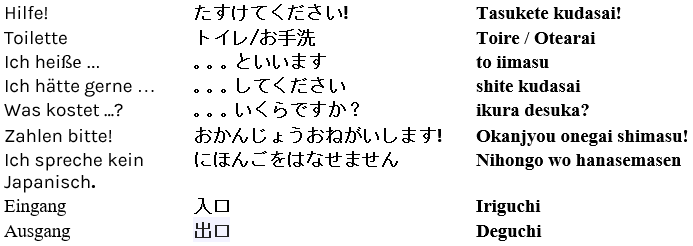Interesting facts about the language
The origin and classification of the Japanese language are highly controversial among linguists. No precise relationship to other languages can be established, mainly due to the very late written evidence from the 8th century AD. There are striking similarities to Korean and the Altaic languages (Turkic, Mongolic, and Tungusic).
A special feature of Japanese is that there are almost exclusively native speakers and virtually no second language speakers in the world. Therefore, Japanese is not considered a global language, although with 127.7 million speakers it is the ninth most spoken language in the world. The largest groups of Japanese living abroad are found in the USA and South America (primarily Brazil), and there is also a relatively large group in Germany.
The language structure and grammatical structures of Japanese are largely identical to Korean, but apart from a few Chinese foreign words, there are no similarities in the vocabulary. This demonstrates how difficult it is to classify the Japanese language. The only proven relationship to Japanese is the Ryukyu languages, spoken on the Ryukyu Islands. However, some scholars also classify these as Japanese dialects.
The modern Japanese writing system is one of the most complex in the world. It consists of kanji, which originate from the Chinese writing system. These characters often form the root of words. Kana, which consists of the syllabary scripts hiragana and katakana, is also used. Hiragana is mostly used to represent grammatical functions. Katakana, on the other hand, is primarily used for foreign words. The Latin alphabet, called romaji in Japan, is used only for transcribing the language.
Demo version
Lernen Sie zwei Tage lang kostenlos Japanisch. Probieren Sie den Kurs aus und sehen Sie selbst, wie viel schneller Sie Japanisch lernen können, als Sie es für möglich gehalten hätten. Entdecken Sie, wie Japanisch lernen endlich Spaß macht und einfach ist – und wie dieser Kurs Sie wirklich motiviert, jeden Tag zu lernen. Sie werden überrascht sein, wie viel Sie in diesen zwei Tagen lernen werden!
Country information Japan
Japan ist ein ostasiatischer Staat im Pazifik. Zu Japan gehören 6852 Inseln. Das Land grenzt indirekt im Norden und Nordwesten an Russland, im Westen an Nord- und Südkorea und im Südwesten an Taiwan und China. Japan ist der viert größte Inselstaat der Welt. Hauptstadt des Landes ist Tokio. Weitere bedeutende Städte sind Yokohama, Osaka, Nagoya und Sapporo. Japan ist dicht besiedelt und liegt mit ca. 126 Millionen Einwohnern auf Platz elf der bevölkerungsreichsten Länder der Erde. Japan ist eine Parlamentarische Erbmonarchie.
Sights in Japan
On the following websites you will find information about the most beautiful sights in the country.
Benefits of learning the language!
- You will find your way around when you are on holiday in Japan.
- You broaden your horizons and thereby expand your educational level.
- You improve your career opportunities.
- They contribute to integration.
- They ensure better communication in bilingual relationships.
- This way you get to know a lot of people and can communicate with each other.
What’s special about the language course
- The language course is suitable for beginners, advanced learners and those returning to the language.
- Within 3 months you can learn the basic vocabulary of over 1,300 Japanese words.
- With the basic course you will reach levels A1 and A2 of the Common European Framework of Reference for Languages.
- With the advanced course you will reach levels B1 and B2 of the Common European Framework of Reference for Languages.
- With the technical vocabulary you will reach levels C1 and C2 of the Common European Framework of Reference for Languages.
- Short daily learning time of only 17 minutes a day.
- The daily tasks are given to you and what you have already learned is repeated until it is stored in your long-term memory.
- Learn with different learning methods.
- You don't want to learn alone! Join learning communities and make new connections.
Online Sprachkurs:
- Neueste Version: Die Sprachkurse wurden im Jahr 2020 vollständig überarbeitet.
- Für Windows, Linux, Mac OS, iPhones, Android-Smartphones, IPad und Android-Tablets.
- Über 540.000 Sprachkurse wurden bereits verkauft.
- Software Made in Germany
The most important words in Japanese
Japanese Part 1
Japanese Part 2
Japanese Part 3
Wie gut ist mein Japanisch?
Finden Sie heraus, wie gut Ihr Japanisch ist, indem Sie den kostenlosen Japanisch-Test online machen! Sie haben bereits Japanisch Kenntnisse erworben und möchten Ihr Japanisch auffrischen oder verbessern? Sie wissen nicht, welcher Sprachkurs (auf welchem Niveau) der richtige für Sie ist? In nur 3 Minuten finden Sie heraus, wo Sie sich darin einordnen können: Dieser Japanisch-Sprachtest folgt den Richtlinien des Gemeinsamen Europäischen Referenzrahmens für Sprachen (GERS). Basierend auf diesen Empfehlungen des Europarates können Sie sehen, auf welchem Niveau (A1 - C2) Sie Japanisch lernen sollten.







